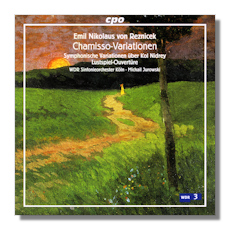
The Internet's Premier Classical Music Source
Related Links
- Reznicek Reviews
- Latest Reviews
- More Reviews
-
By Composer
-
Collections
DVD & Blu-ray
Books
Concert Reviews
Articles/Interviews
Software
Audio
Search Amazon
Recommended Links
Site News
 CD Review
CD Review
Emil Nikolaus von Reznicek

Orchestral Works
- Eine Lustspiel-Ouvertüre
- Chamisso Variations
- Symphonic Variations on Kol Nidre
- Eine Lustspiel-Ouvertüre *
- Donna Diana Overture *
WDR Symphony Orchestra, Köln/Michail Jurowski
* Grosses Opernorchester Parlophon/Emil Nikolaus von Reznicek
CPO 777047-2 DDD/*mono 65:40
The long-lived Reznicek (1860-1945) has the misfortune, like Leoncavallo, of having acquired a reputation as a one-work composer, and that work (the overture to his opera Donna Diana) coming near the beginning of his career. The CPO label is out to right that wrong, almost single-handedly, as it so often does with other forgotten or nearly-forgotten composers.
In his sometimes laughably prolix booklet note, Eckhardt van den Hoogen recounts Reznicek's ability to bounce back after every trick of fate or example of resistance. Part of Reznicek's genius was to remain a moving target. As a composer, he is difficult to classify, and (like author Henry James) he can be so subtle that whether or not he is pulling the listener's leg can be difficult to discern. Take, for instance, the Chamisso Variations, more completely called "Theme and Variations after the poem "Tragic Tale" by Adalbert von Chamisso." The "tragic tale" concerns a man whose pigtail hangs down "his back part." By turning around, the man hopes to bring the pigtail to his front, but no matter how often or how fast he turns, the pigtail remains in back. Just to make sure we get the point, Reznicek brings in a bass at the end of the work to sing the tale/tail. Might Reznicek have been telling his critics, well-meaning and otherwise (Richard Strauss was a friend and self-appointed mentor!), that there was no point in telling him to be something that he was not? Indeed, there are many suggestions of Strauss in this work, but it is not hard to hear these suggestions as slightly mocking, and sometimes even as grotesque, as if Reznicek were determined to have the last laugh. Actually, he does. This is music that impresses the listener with Reznicek's skill and imagination, and fascinates him with his elusiveness.
The Symphonic Variations on Kol Nidre are similarly difficult to pin down. Jews take the Kol Nidre, a prayer of atonement recited at Yom Kippur, very seriously, and it was the basis of a similarly serious piece for cello and orchestra by Max Bruch. Reznicek doesn't parody the traditional melody – not exactly, anyway – but neither does he treat it with kid gloves. Perhaps this is because the meaning of the Kol Nidre has been interpreted in several ways; could it be that Reznicek is representing this ambiguity musically? Throughout the course of the work, Reznicek pours the melody into many different vessels, some suggestive of "light music," and others beautiful or serious. This is a fascinating piece, maybe because it is difficult to know exactly what Reznicek was driving at in it.
Eine Lustspiel-Ouvertüre is a relatively straightforward bit of fun, more in the gently malicious vein of Donna Diana than the other works on this CD. Why it hasn't become more popular is a mystery to me. The disc allows us to hear not only Jurowski's excellent modern performance, but the composer's own (slightly cut and dimly recorded), from 1922. Reznicek's recording of Donna Diana, also from 1922, is another bonus, although the sound is no less primitive.
Michail Jurowski, who has conducted several of cpo's earlier Reznicek discs, has a good ear for the music's color and structure. These performances are vivid, convincing and nicely played, and the conductor resists the temptation to present the music too "winkingly." Bass Alexander Vassiliev makes a small but positive contribution in the Chamisso Variations. The engineering is bright and full too. If Korngold and Strauss are your "thing," you'll probably like this CD.
Copyright © 2008 by Raymond Tuttle




















